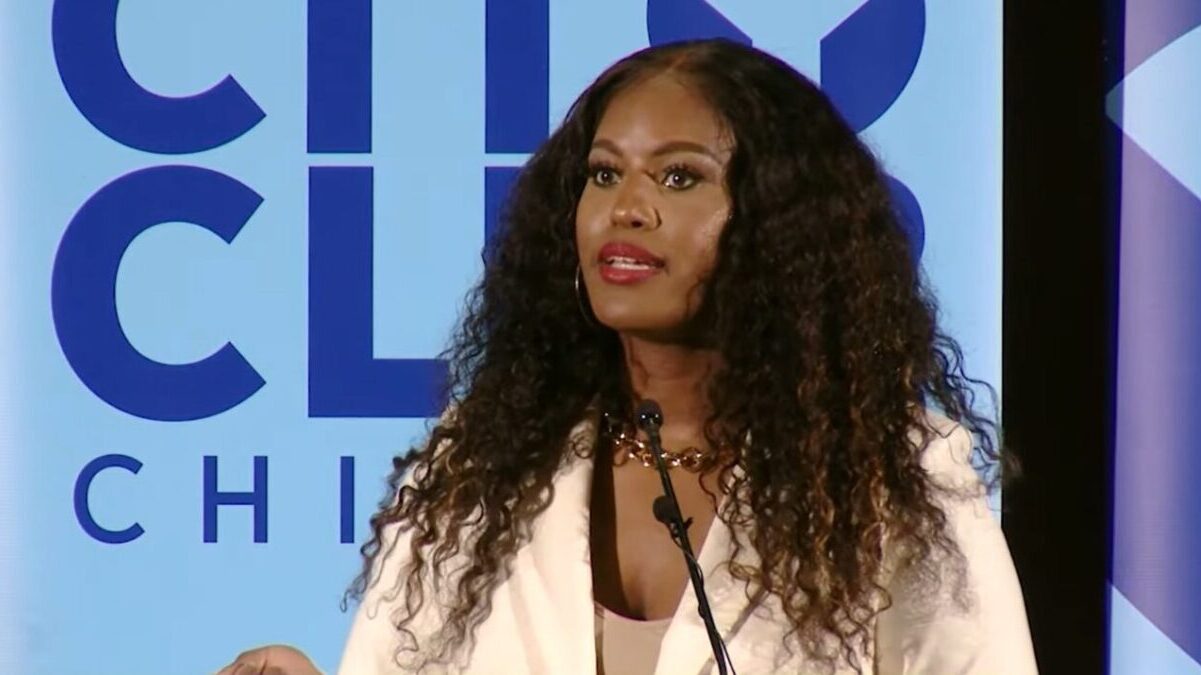AI stands for Artificial Intelligence, not ‘Actual Intimacy’.
Over the past several months, Americans have been treated to article after article detailing the benefits and dangers of artificial intelligence. From writing term papers to dispensing legal and medical advice to possibly causing human extinction, AI has the potential to revolutionize how we think and interact with the world around us.
That revolution will not stop with how human beings relate to machines, either. Recently in the New York Post, Ariel Zilber discussed claims made by Mo Gawdat, former head of Google’s semi-secret research and development group X, that a combination of virtual reality and AI-powered robots will initiate a “redesign of love and relationships.” In essence, Gawdat is predicting the rise of the “sexbot,” an artificial sexual partner that will eliminate the “quite messy” issues that plague human interactions.
The sexbot has a long pedigree in science fiction, but Gawdat’s musings go much further than mere sensual satisfaction. In his vision of technological love, “It’s all signals in your brain that you enjoy companionship, and sexuality, and — if you really want to take the magic out of it — it can be simulated.”
AI will apparently transform not just romantic attachment, but platonic friendship as well.
These developments are gaining traction at a time when people feel less connected to those around them than ever before. According to a report from the surgeon general, we are currently suffering through an “epidemic of loneliness and isolation” that will have grave consequences for both our own and future generations.
As tech gurus like Gawdat offer us a digital lotus plant to treat our isolation, we must instead look back to more ancient principles if — as St. Augustine puts it in his Confessions — our quest “to love and to be loved” is to bear more than bitter fruit.
‘Old School’ Friendship
Ancient thinkers recognized that efforts to secure friendship could have several motivations. One might become friends with another to simply enjoy his company or to pursue common interests. More cynically, one might seek friendship in order to achieve some kind of gain, material or otherwise. According to “Book VIII” of Aristotle’s Nicomachean Ethics, these lesser friendships are inherently unstable, for they are founded on the pleasure or benefit sought, and “people do not often consider the same thing to be useful or enjoyable for long.”
Creating a true and lasting bond of friendship requires something more fundamental: a mutual love for the “good,” which, as Aristotle says later, drives “good men to put their virtue into practice.”
The Roman statesman Cicero developed this theme further in his De Amicitia by defining friendship as “a complete accord on all subjects human and divine, joined with mutual goodwill and affection.” Such a unity of thought and purpose can only be obtained through virtue, which is “the parent and preserver of friendship, and without it friendship cannot possibly exist.”
Of course, a relationship based on virtue has its pitfalls. If friends are meant to help one another to discover and practice what is good, then eventually one may need to take his friend to task. In such cases, the ancient writers agree a friend is bound to speak the truth, however painful.
As St. Augustine puts it in one of his letters, “For no one can truly be a friend of another person unless he is first a friend of the truth, and if that is not done gratuitously it cannot be done at all.” In this sentiment, he echoes Cicero’s contention that “if a man’s ears are so closed to plain speaking that he cannot bear to hear the truth from a friend, we may give him up in despair.”
Friendship vs. ‘Friending’
While it’s tempting to place most of the blame for our current isolation crisis on Covid-19, the pandemic simply accelerated the decay caused by the Digital Age. In her 2012 book Alone Together, sociologist Sherry Turkle wrote, “We brag about how many we have ‘friended’ on Facebook, yet Americans say they have fewer friends than before.” This is because, despite its promises of greater connection, the digital world sets itself at odds with the ancient principles of friendship.
The online environment blurs the lines between true friendship and its lesser incarnations. A Facebook “friend” may be a business associate, someone who shares your love of cats and “Star Trek,” or even someone with whom you have no connection at all but who has “friended” a “friend” of yours.
Superficial connection becomes easily confused with the rarer and more precious type of friendship, often leaving those involved confused about which is which.
Online, it is easy to be what you wish others to see rather than what you are. The most extreme examples of such behavior, like the sexual predator trolling for victims as a virtual 14-year-old girl, are terrifying enough, but there are more subtle dangers as well.
The “fluidity of self” that the digital world allows resolves itself in an individual living multiple virtual lives, each embodying distinct aspects of that individual’s personality.
The embrace of multiple online identities has serious ramifications for the connections we make. Turkle cites psychoanalyst Philip Bromberg’s description of online life as granting us “the capacity to feel like one self while being many.” Our lives online become a matter of premeditation, every word and picture a matter of crafting an image that will be set in virtual stone. When people do actually interact with one another, the digital avatars they’ve chosen impose limits that they do not wish to have challenged. This internal division and editing inhibit the development of true friendship, which requires honesty above all else.
The rise of AI will exacerbate this already existing conflict between true friendship and digital “friending.” Rather than engaging with other human beings with independent personalities and wills, we will literally be able to “make” friends (and lovers) that are mere reflections of ourselves. They will be digital “yes men,” incapable of speaking truth to us. Gawdat’s effort to “redesign” human relationships ultimately becomes a narcissistic exercise devoid of even the crude connections that Aristotle’s lesser friendships require.
A Return to True Friendship
So how might we restore the ancient concept of friendship based on virtue and truth when our world is becoming more virtual by the day? We must begin by believing we can restore it in the first place.
History shows us we can control our reactions to new technology; we must not surrender to its charms but strive against them when appropriate. We need a more disciplined approach to the wonders of this brave new world of online interaction, one that involves setting strict limits on how and when it is used, especially by young people.
More importantly, we must make certain to interact with our friends (of both the lesser and greater varieties) not only in real time but also in real life. There is a more true connection to be found in a simple 10-minute conversation over coffee (with smartphones set to “private”) than in hours of scrolling through “comments” sections — especially if such conversations plumb the depths of what is true, good, and beautiful.
The wonders of online existence, including the benefits of artificial intelligence, can lead us astray only if we let them do so. A return to the ancient understanding of friendship and its pleasures represents a vital counterbalance to the harmful banality of relationships in the Digital Dark Age.
" Conservative News Daily does not always share or support the views and opinions expressed here; they are just those of the writer."




